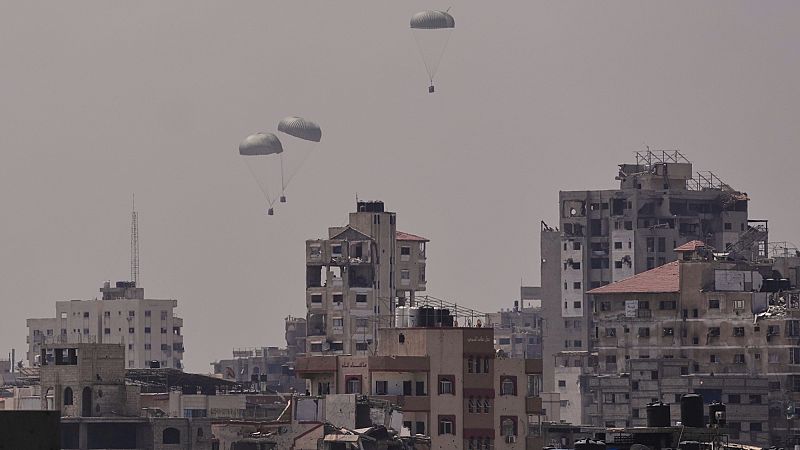Escalation in the Gaza Conflict Sparks International Outcry
The recent decision by Israel to seize control of Gaza City has triggered widespread condemnation from European and global leaders. This move has raised serious concerns about the potential worsening of the already dire humanitarian situation in the region, leading to Germany suspending its exports of military equipment that could be used in Gaza.
The Israeli security cabinet approved this controversial plan early Friday, marking a significant escalation in the country’s ongoing conflict with Hamas, which has lasted nearly two years. The decision came after intense discussions among senior security officials, with Prime Minister Benjamin Netanyahu emphasizing that while Israel aims to take control of all of Gaza, it does not intend to occupy the area permanently.
Germany’s Response and Policy Shift
German Chancellor Friedrich Merz made a notable shift in policy by announcing that military equipment exports to Gaza would be suspended until further notice. This decision deviates from the traditional German foreign policy stance, known as Staatsräson, which emphasizes the close relationship between Israel’s security and Germany’s national interests. Merz stated that the new military push by the Israeli security cabinet raises questions about the feasibility of achieving the stated goals. He emphasized that the German government will not authorize any military equipment that could be used in Gaza until there is clarity on how these objectives will be met.
Merz also highlighted the responsibility of the Israeli government to ensure that civilians receive necessary supplies and urged them to avoid any steps toward annexing the West Bank. This sentiment was echoed by other European leaders who expressed concern over the potential for increased suffering and destruction in Gaza.
UK’s Strong Condemnation
UK Prime Minister Keir Starmer strongly condemned Israel’s decision to escalate its offensive in Gaza, calling it wrong and urging immediate reconsideration. He warned that such actions would only lead to more bloodshed and fail to resolve the conflict or secure the release of hostages. Starmer called for a ceasefire, an increase in humanitarian aid, and a negotiated solution to the conflict. He also emphasized that Hamas should not play any role in the future of Gaza and must disarm.
The UK is working with allies to develop a long-term strategy for peace in the region, aiming for a two-state solution.
Reactions from Other European Leaders
Other European politicians have also voiced their concerns. Spain’s Foreign Affairs Minister José Manuel Albares condemned the decision to take over Gaza, stating it would only provoke more destruction and suffering. His Dutch counterpart, Caspar Veldkamp, described the plan as a “wrong move” and stressed the need for immediate improvements in the humanitarian situation. Slovenia’s Foreign Minister Tanja Fajon strongly condemned the Israeli plans and urged Israel to halt any attempts to militarily occupy Gaza.
Finland’s Foreign Minister Elina Valtonen expressed extreme worry about the worsening conditions in Gaza, hoping for an immediate ceasefire and the release of Israeli hostages. European Commission President Ursula von der Leyen called on the Israeli government to reconsider its decision to expand its military operation in Gaza, prioritizing the release of hostages and the delivery of humanitarian aid.
European Council President António Costa reacted strongly to Netanyahu’s takeover plan, urging the 27-member bloc to take action. He pointed out that Israel’s decisions, along with the expansion of settlements in the West Bank, the destruction in Gaza, and the blockade of humanitarian aid, are contrary to international law and violate the EU’s recent agreements to improve the humanitarian situation in Gaza.
Mixed Reactions Within Israel
Reactions within Israel were divided. Opposition leader Yair Lapid criticized the government’s plan, arguing it contradicts the advice of military leadership. Chief of the General Staff Lieutenant General Eyal Zamir warned that the plan would endanger the lives of hostages and stretch the military thin. Netanyahu denied any intention to permanently control Gaza, stating that Israel aims to establish a security perimeter and hand over the Strip to a coalition of Arab forces.
Ongoing Humanitarian Crisis
Humanitarian organizations continue to warn of severe conditions in Gaza, where widespread hunger and displacement are increasing daily. The ongoing conflict has displaced nearly the entire population of Gaza, destroyed over 60% of the enclave’s buildings and infrastructure, and brought most of its 2 million residents to the brink of famine.
The war began when Hamas-led militants attacked southern Israel on 7 October 2023, killing some 1,200 people and taking 251 hostages. Fifty hostages are still being held, although fewer than half are believed to be alive. Israel’s subsequent offensive resulted in the deaths of over 60,000 Palestinians, according to the Hamas-run Gaza Health Ministry, while the Israeli military reports nearly 900 of its soldiers have died since the start of the war.

